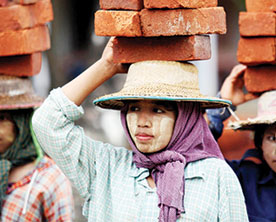There are three kinds of people in working society, pink-collar workers, blue-collar workers and white-collar workers, but I would like to focus on blue-collar workers in Myanmar, who are doing physical work in industry or the people who are taking up any jobs that come by. They do not descend from upper class or middle-class society but from lower class and working-class society so they do not have any trace of ostentation. Some are open-minded, honest and hardworking. Unfortunately, they also do not hold any degree or other educational qualifications. Without a degree from university, they do not get into a wellpaid job in Myanmar. They live from hand to mouth. They earn roughly $3 a day for their work.
In Yangon, costs of living are skyrocketing for tenants. Accommodation costs are going up today because of brokers’ manipulation and Myanmar’s perceived economic boom. Life is really an struggle in Yangon for unskilled workers especially when they also have responsibility for their families. Young people without degree usually work as taxi drivers, trishaw drivers, construction workers, etc. The rate of unemployment is getting higher and higher day by day. Young women work in the garment factories because Myanmar’s garment sector has become attractive for foreign investors due to the relatively low wages in Myanmar. The current situation is that many children and adults come from long-distance rural areas, especially the countryside and delta regions in Myanmar so they usually lack access to any, let alone quality education. Taking a job at a young age is seen by many families as essential to ensure their day-to-day survival. Many industries in Myanmar employ young workers, from rice mills and teashops to wood processing factories and, yes, garment factories.
Workers from garment industry earn a miserly $3 on a day but Western clothing companies are fighting a government proposal to set the country’s first-ever minimum wage at roughly $3.25 a day. Myanmar Garment Manufacturers Association (MGMA) recognizes that this situation will not change overnight. Abolishing all underage employment in the garment industry, even if it could be accomplished in one moment, would result in many underage persons – 90% of them young women – seeking desperate alternatives to ensure their family’s survival. We do not want that alternative be something negative. We want continuing education and schooling to be their alternative. We must acknowledge the reality, too, that European and US buyers – in addition to buyers in dozens of other countries – have a strong and unyielding opposition to sourcing from garment factories that employ any underage persons. That is not good news for our generation but they do not have any flexibility to choose the jobs they wish. Young people are looking forward to getting job opportunities.
In monsoon season, job opportunities are even rarer for young people, especially for the non-graduates. If a young man searches for a job in Yangon, he will earn just 100,000 kyats, or $85, per month, for six days of full-time work because he does not have a medium level of proficiency in English and work experience related to his field. This barely covers lunch, transportation, and some other expenses.
If a country has high rate of unemployment, the crime rate will increase, and unemployment youth will lose confidence in the society that has failed to give them the opportunities to realize their potential. Hence, the government needs to create job opportunities for the most of Myanmar’s youth for future development of country.
Youth unemployment is a global concern. The ILO estimates 40 percent of world’s 160 million jobless are between the ages of 15 and 24, and that 85 percent of the 1 billion in that age bracket live in developing countries. Global unemployment levels among youth are on average two to three times higher than they are for adults, according to the agency, and young people are more likely to work low-paying, temporary jobs that do not offer security or employment benefits.
Estimates vary on the scope of unemployment in Myanmar. The US Central Intelligence Agency says it is 5.4 percent, for example, but a parliamentary committee recently put the figure at 37 percent. ILO says there are no accurate figures.
What is clear, experts say, is that Myanmar needs agencies and programs that will allow the unemployed to access jobs and skills training in the short term, and vocational training and labor institutions that will help build a workforce over the longer term.
Some young people are leaving for foreign countries especially Singapore, Japan and Korea in search of a better life, even as the country grabs international headlines and tries to woo foreign investors with tax breaks, special economic zones, and a new foreign investment law.
Myanmar unskilled workers in foreign countries earn about $400 per month, compared with about $100 or $200 at home for similar work. Those with university degrees can earn about $1,500 per month abroad, compared with domestic salaries of just $200 to $300 for the same work. A few international companies in Yangon pay local managers up to $2,000 or $3,000 per month, but such cases are relatively rare. That is why educated people mostly leave home to overseas for greener pastures. The ruling government needs to create job opportunities for youths. Today’s youths are the force, hope and leaders of tomorrow. They are the future of society, community and the country.










